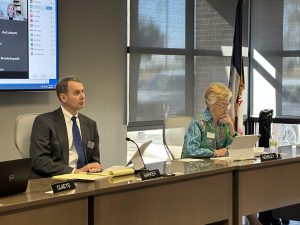Iowa Board of Regents hears opposition to proposed DEI policy from students, state officials
June 12th, 2025 by Ric Hanson
(Iowa Capital Dispatch) – Members of the Iowa Board of Regents told the public Wednesday they are listening and slowing down the process of implementing new board policy relating to diversity, equity and inclusion in classroom instruction. Regents said whatever policy is eventually approved might look different than its current form.
According to the Iowa Capital Dispatch, Regent David Barker said a proposed policy barring universities from requiring students to take courses with “substantial content that conveys DEI or CRT (critical race theory)” to earn their credentials, with pathways to certain course exceptions, “will be an important first step” in preventing the teaching of controversial ideas as fact and raising confidence in higher education once again.
The board discussed the policy in its June 11 meeting, the first of two readings ahead of a vote for approval in July.
Under the proposed policy, students could not be required to take courses with “substantial content” covering areas “as primary principals” that include topics like antiracism, allyship, microaggressions, types of biases or privileges, social justice, critical race theory and systematic oppression, marginalization or gender theory, among others.

The Iowa Board of Regents read for the first time a policy that would bar required university courses with “substantial” DEI content. (Photo by Brooklyn Draisey/Iowa Capital Dispatch)
Mark Braun, executive director of the board of regents, acknowledged during discussion the vagueness behind the term “substantial,” but said board staff will work with the institutions to more clearly define it and demonstrate where it should apply as the policy is implemented. He emphasized that this policy would only apply to required courses and not electives.
“To a large extent, this will help highlight just how many academic programs do not require courses that meet the substantial standard,” Braun said.
Also included in the policy is an option for seeking exemption, Braun said, as the board understands some courses must include this content for different reasons. According to the policy draft, universities can submit which majors, minors and certificates should be exempted from the rules “each even-numbered year, no later than June 30.” The board must approve these requests.
Regent Christine Hensley and Barker said during the meeting they learned from the emails sent after the suggested policy was released by concerned parties, some of which Barker said were “a bit on the arrogant and pompous side” or “showed a misunderstanding of the policy.” However, what helpful information he said he received helped him determine that a better version of this first-draft policy could be developed.
The goal behind the policy is not to subdue a certain point of view, Barker said, but to prevent attempts on both sides of the political spectrum to present “contested, controversial ideas as settled fact.”
When the policy was first released, Hensley said the discussion this week was supposed to act as the first and second reading, which she said “lit a firestorm” in many people worried about the policy heading too quickly toward approval.
“I am a very, very strong proponent of when you have something that is controversial, and I would say that this has been controversial, it’s important that you take a pause — you push the pause button — you step back, and you take in information from the various groups out there,” Hensley said.





